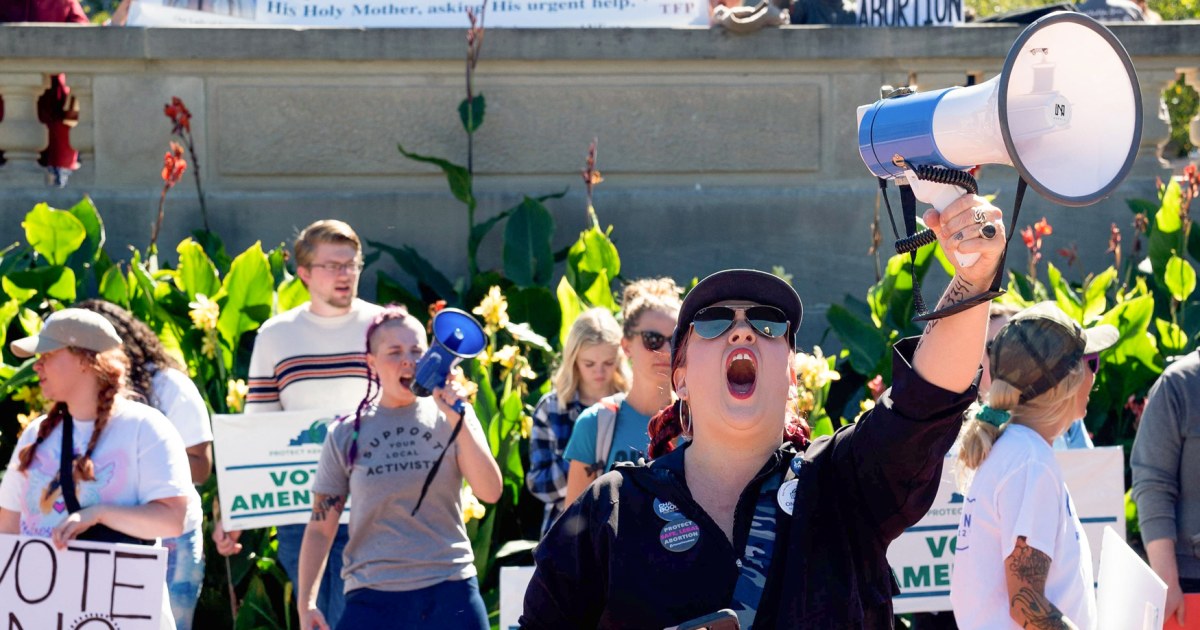
A Kentucky woman who is eight weeks pregnant filed a lawsuit Friday challenging the state’s near-total ban on abortion.
The suit alleges that Kentucky’s abortion laws violate the state Constitution and are causing irreparable harm to the plaintiff, identified only as Jane Doe, and others like her. It asks the court to permanently block the state from enforcing those laws.
The suit also seeks class-action status to represent all people in Kentucky who are pregnant and want an in-state abortion.
“I am angry that now that I am pregnant and do not want to be, the government is interfering in my private matters and blocking me from having an abortion,” Doe said in a statement announcing the lawsuit. “This is my decision — not the government’s or any other person’s.”
The lawsuit comes on the heels of another filed by a pregnant woman who has been unable to obtain an abortion in Texas. On Thursday, a Texas judge granted an emergency order in that case, allowing the woman, whose fetus has a fatal diagnosis, to get an abortion in the state.
The cases are among the first of their kind — very few pregnant women have filed lawsuits challenging state restrictions on their ability to seek abortions.
Planned Parenthood is also a plaintiff in the Kentucky lawsuit, and both are represented by attorneys from the American Civil Liberties Union, Planned Parenthood Federation of America and two private law firms.
The suit targets two Kentucky laws enacted after the Supreme Court’s Dobbs decision, which last year overturned the right to abortion established by Roe v. Wade. The first law prohibits seeking or administering an abortion in almost all instances. Under the second, it is a felony for doctors in Kentucky to perform an abortion after the sixth week of pregnancy except to prevent the death or “substantial and irreversible impairment of a major bodily function” of the pregnant woman. There are no exceptions for rape, incest or a fatal fetal condition.
Amber Duke, executive director of the ACLU of Kentucky, said at a news conference Friday that the bans have left “thousands of Kentuckians to manage life-altering consequences and serious health risks over the past year.”
“I am bringing this lawsuit because I firmly believe that everyone should have the ability to make their own decisions about their pregnancies,” Doe said in her statement. “I hope this case will restore abortion access in Kentucky, if not for me then for the countless people in the future who deserve the autonomy to decide what is best for themselves and their families.”
The lawsuit alleges that the inability to access abortion is harming Doe and others who want to terminate their pregnancies. Such women, it says, “are being or will be forced to suffer the life-altering physical, emotional, economic, and family consequences of unexpected pregnancy and childbirth.”
“These consequences can be particularly acute for patients who are pregnant as a result of rape, experiencing domestic violence, or facing fetal diagnoses incompatible with sustained life after birth,” the lawsuit continues.
It also argues that women experiencing pregnancy complications that might impair their health but which don’t qualify for abortions under state law could suffer serious, potentially lifelong health consequences.
“Even those whose dire situations may technically qualify for one or both of the Bans’ varying emergency exceptions may still be refused care out of hospitals’ or providers’ fears of being held criminally liable,” the lawsuit adds.
In November 2022, Kentucky voters rejected a ballot proposal, known as Amendment 2, that would have changed the state Constitution to explicitly say that it does not protect a right to abortion.
Duke said in a statement that many Kentucky voters support access to abortion care: “They said so clearly when they soundly rejected anti-abortion Amendment 2.”
“We hope for a victory that aligns with the will of the people and overturns these unconstitutional bans,” she added.
The lawsuit names Kentucky Attorney General Daniel Cameron, as well as leaders of the state’s Board of Medical Licensure and Cabinet for Health and Family Services.
The attorney general’s office told NBC News in a statement that it is reviewing the complaint. The other defendants did not immediately respond to requests for comment.
Brigitte Amiri, the lead litigator in the case and an attorney with the ACLU’s Reproductive Freedom Project, said the motions filed are expected to come before a judge Dec. 18.






